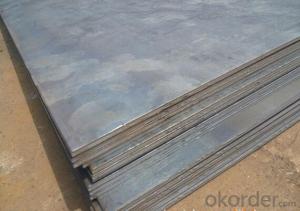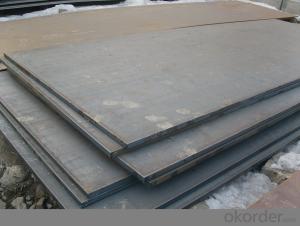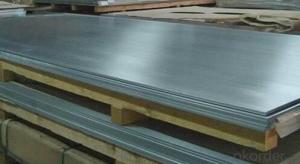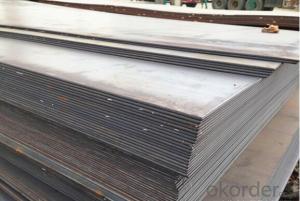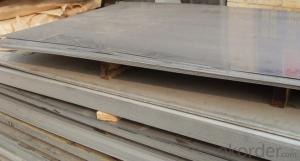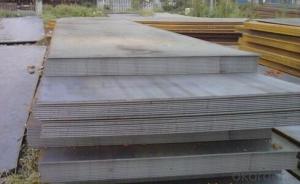SPHC SS400 HR Hot Rolled Steel Coil/Sheet
- Loading Port:
- Tianjin
- Payment Terms:
- TT OR LC
- Min Order Qty:
- 3 m.t.
- Supply Capability:
- 100000 m.t./month
OKorder Service Pledge
OKorder Financial Service
You Might Also Like
Item specifice
SPHC SS400 HR Hot Rolled Steel Coil/Sheet
Detailed Information of SPHC SS400 HR Hot Rolled Steel Coil/Sheet
| C | Si | P | S | yield Strength MAp | Tensile strength MAp | Elongation % | ||
| A36 | 0.24 | 0.4 | 0.045 | 0.03 | 250 | 400-520 | 26 | |
| C | Si | Mn | P | S | Cu | |||
| A283 | ≤0.27 | 0.15-0.4 | ≤0.9 | ≤0.035 | ≤0.04 | ≥0.2 | ||
| Thickness: | 6mm, 8mm, 12mm, 16mm, 20mm, 25mm, 30mm, 50mm, 80mm, 100mm, 150mm, 200mm | |||||||
| Width: | 1500mm, 1800mm, 2000mm, 2200mm, 2500mm | |||||||
| Length: | 6000mm, 8000m, can cut to width and length | |||||||
| Packing Details; | according to customer‘s require or export’s standard | |||||||
| Delivery time; | 7 days for stock sizes, 20-25 days for new production sizes | |||||||
| Port: | Tianjin China | |||||||
Related Products Overviews of SPHC SS400 HR Hot Rolled Steel Coil/Sheet
Product Name | Typical Grades | Diameter(mm) | Standard Adopted |
Carbon Steel | 20 (1020/S20C/C22) |
Ø16-Ø300 |
GB/SAE/ JIS/DIN |
40 (1040/S40C/C40) | |||
45 (1045/S45C/C45) | |||
Bearing Steel | GCr9 (51100/SUJ1) |
Ø12-Ø250 | |
GCr15 (52100/SUJ2/100Gr6) | |||
GCr9SiMn (A485-Gr.1/SUJ3) | |||
Cr-Mo Steel | 20Cr (5120/SCr420H/20Cr4) |
Ø12-Ø250 | |
40Cr (5140/SCr440/41Cr4) | |||
42CrMo(4140/SCM440/42CrMo4) | |||
Gear Steel | 20CrNiMo |
Ø16-Ø600 | |
20CrMn(5115/SMnC420/20MnCr5) | |||
20CrNiMo(8620/SNCM220/20CrMiMo2) |
Related Products Application of SPHC SS400 HR Hot Rolled Steel Coil/Sheet
Carbon Steel | l Mold bottom l Plastic mold l Construction machinery parts l Automobile parts l Security grills l Screens l Construction |
Bearing Steel | l Aerospace l Navigation l Nuclear energy l Chemical industry l Electronic information l Petrochemical l Instrument and meter l Transportation |
Cr-Mo Steel | l Mechanism & Fasteners gear l Stressed components for vehicles l Engines and machines l Parts of larger cross-section |
Gear Steel | l All kinds of gears l Statically and dynamically stressed component for vehicles l Engines and machine l Larger cross-section parts l Crankshafts |
Company Introduction of SPHC SS400 HR Hot Rolled Steel Coil/Sheet
CNBM International Corporation is the most import and export platform of CNBM group(China National Building Material Group Corporation) ,which is a state-owned enterprise, ranked in 270th of Fortune Global 500 in 2015.
With its advantages, CNBM International are mainly concentrate on Cement, Glass, Iron and Steel, Ceramics industries and devotes herself for supplying high quality series of refractories as well as technical consultancies and logistics solution.
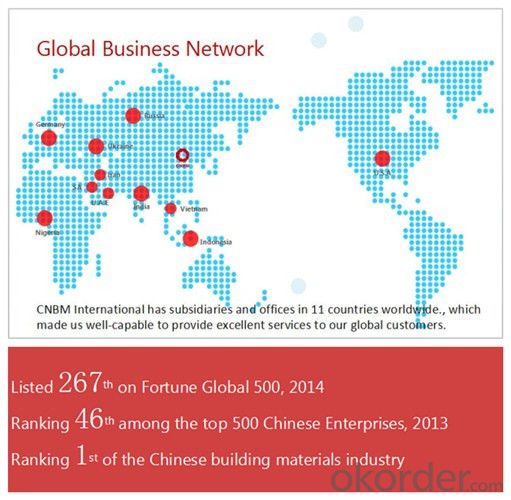
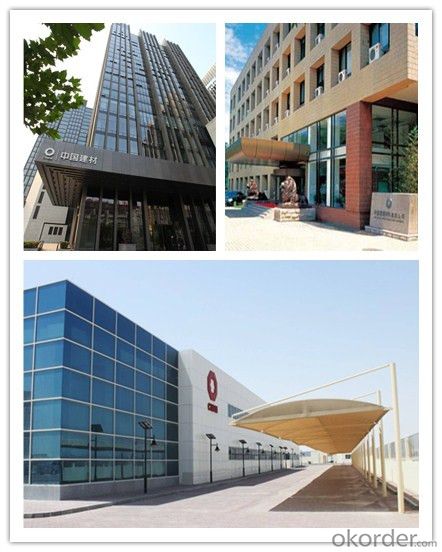
After-sale service | l CNBM provides the services and support you need for every step of our cooperation. We’re the business partners you can trust; you can relax and get on with doing business. l For any problem, please kindly contact us at any your convenient time, we’ll reply you in our first priority within 24 hours
|
Advantages
| l Industry experience over 20 years. l Shipment of goods -More than 70 countries worldwide. l The most convenient transport and prompt delivery. l Competitive price with best service. l High technical production line with top quality products. l High reputation based on best quality products.
|
Packaging & Delivery of SPHC SS400 HR Hot Rolled Steel Coil/Sheet
Packaging Detail | Sea worthy packing /as per customer's packing instruction |
Delivery Detail | 15 ~ 40 days after receiving the deposit |
Products Show
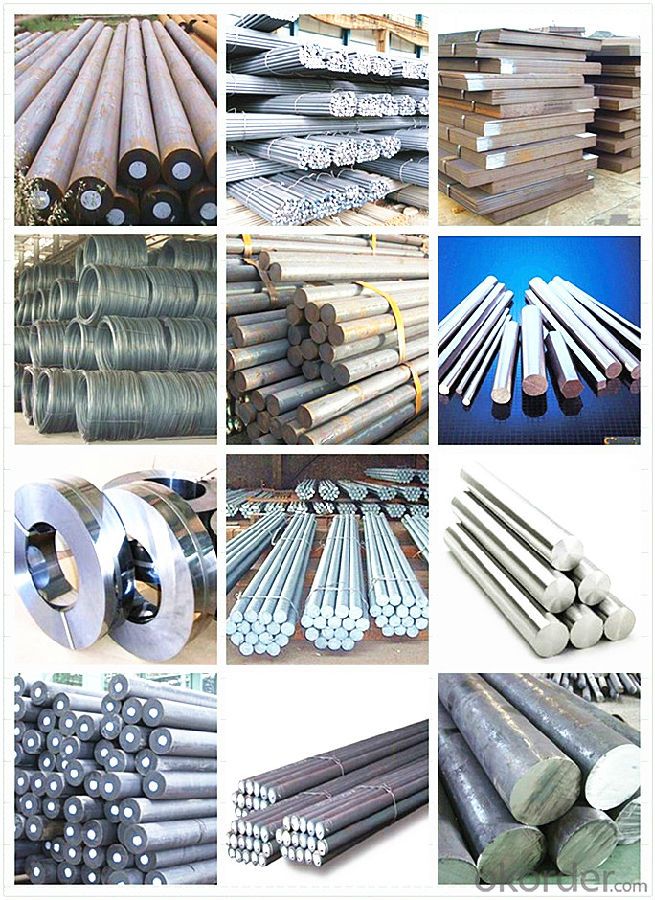
FAQ:
Are you a trading company or manufacturer? | Manufacturer |
What’s the MOQ? | 3 metric ton |
What’s your delivery time? | 15-35 days after downpayment received |
Do you Accept OEM service? | Yes |
what’s your delivery terms? | FOB/CFR/CIF |
What's the Payment Terms? | 30% as deposit,70% before shipment by T/T |
Western Union acceptable for small amount. | |
L/C acceptable for large amount. | |
Scrow ,Paybal,Alipay are also ok | |
Why choose us? | Chose happens because of quality, then price, We can give you both. Additionally, we can also offer professional products inquiry, products knowledge train (for agents), smooth goods delivery, excellent customer solution proposals. |
What's your available port of Shipment? | Main Port, China |
What’s your featured services? | Our service formula: good quality+ good price+ good service=customer's trust
|
Where are your Market? | Covering more than 160 countries in the world |
- Q:What are the most common alloys used in special steel?
- The most common alloys used in special steel are chromium, nickel, molybdenum, and vanadium.
- Q:What are the different grades and specifications of special steel?
- Special steel refers to a wide range of high-quality steels that are specifically designed to possess exceptional properties and meet specific requirements for various industrial applications. These grades and specifications of special steel are determined based on their composition, mechanical properties, and intended use. One commonly used grading system for special steel is the AISI-SAE system, which categorizes special steel into different grades based on their chemical composition. For example, AISI-SAE 4140 is a popular grade of special steel known for its high strength, toughness, and wear resistance. It contains elements such as chromium, molybdenum, and carbon, which contribute to its exceptional properties. Another widely used grading system is the ASTM system, which classifies special steel based on their mechanical properties and intended use. ASTM A36 is a commonly used grade of special steel that is known for its excellent weldability, toughness, and low carbon content. It is often used in structural applications, such as building construction and bridges. There are also specific grades and specifications of special steel for particular industries or applications. For example, stainless steel is a special steel grade that contains a high percentage of chromium, which provides excellent corrosion resistance. Stainless steel is commonly used in applications where resistance to moisture, chemicals, and high temperatures is required, such as in the food industry or medical equipment manufacturing. Furthermore, tool steel is a special steel grade specifically designed for making cutting and shaping tools. It possesses high hardness, wear resistance, and heat resistance, making it suitable for applications such as machining, forging, or die casting. In addition to these grades, special steel can also be categorized based on their specifications, such as heat treatment requirements, surface finish, or dimensional tolerances. These specifications ensure that the special steel meets the specific requirements of the intended application. Overall, the different grades and specifications of special steel are tailored to meet the diverse needs of various industries and applications, providing superior performance, durability, and reliability.
- Q:How is special steel used in the textile supply chain?
- Special steel is used in the textile supply chain for various applications such as manufacturing textile machinery, equipment, and tools. The high strength and durability of special steel make it ideal for creating components that can withstand the demanding conditions of textile production, including high temperatures, corrosion, and heavy loads. It is commonly used in the production of spinning machines, looms, needles, and other crucial parts, ensuring efficient and reliable textile manufacturing processes.
- Q:Can special steel be used in the production of medical implants?
- Yes, special steel can be used in the production of medical implants. Special steel alloys such as stainless steel or titanium alloys are commonly used in the manufacturing of medical implants due to their high strength, corrosion resistance, and biocompatibility properties. These materials are carefully selected to ensure compatibility with the human body and to promote successful implantation and long-term functionality.
- Q:What are the different methods of machining special steel?
- There are several different methods of machining special steel, each with its own advantages and applications. Some of the most common methods include: 1. Turning: Turning is a machining process that involves rotating a workpiece while a cutting tool removes material from the surface. This method is typically used to create cylindrical shapes and can produce high-quality finishes. 2. Milling: Milling is a versatile machining method that uses rotary cutters to remove material from a workpiece. It can be used to create complex shapes and contours, and is often employed in the production of special steel components. 3. Drilling: Drilling is a machining process that involves creating holes in a workpiece using a rotating cutting tool. It can be used to create both through holes and blind holes in special steel, and is commonly used in various industries. 4. Grinding: Grinding is a precision machining method that uses an abrasive wheel to remove material from a workpiece's surface. It is often used to achieve tight tolerances and smooth finishes on special steel components. 5. Broaching: Broaching is a machining process that uses a sharp cutting tool with multiple teeth to remove material in a series of linear cuts. It is commonly used to create keyways, splines, and other intricate shapes in special steel. 6. Electrical Discharge Machining (EDM): EDM is a non-traditional machining method that uses electrical discharges to remove material from a workpiece. It is particularly useful for machining special steel with complex shapes or for creating small features. 7. Laser Cutting: Laser cutting utilizes a high-powered laser to cut through special steel with extreme precision. It is commonly used for intricate designs and can produce smooth edges without the need for subsequent processing. Each of these methods has its own advantages and limitations, and the choice of machining method depends on factors such as the desired outcome, the complexity of the part, and the properties of the special steel being machined.
- Q:How does special steel contribute to the textile industry?
- Special steel contributes to the textile industry by providing high-strength and durable components for textile machinery, such as looms, knitting machines, and textile processing equipment. The use of special steel in these machines ensures improved performance, precision, and longevity, thereby enhancing productivity and efficiency in textile manufacturing processes. Additionally, special steel's resistance to corrosion and wear helps maintain the quality and reliability of textile machinery, minimizing downtime and maintenance costs for manufacturers.
- Q:What are the different methods for controlling the grain size in special steel?
- Special steel can be controlled for grain size using various methods. One method is heat treatment, where the steel is subjected to specific temperatures and cooling rates. By controlling the rate of nucleation and growth of new grains, the grain size can be refined. For example, slow cooling encourages the formation of larger grains, while rapid cooling results in smaller grain sizes. Alloying elements can also influence grain size. Elements like vanadium, niobium, and titanium can form carbides, acting as nucleation sites and leading to finer grain sizes. Conversely, elements like aluminum and silicon promote the formation of larger grains. Mechanical deformation, such as rolling or forging, can also affect grain size. These processes break up larger grains into smaller ones, thereby refining the grain size. Techniques like equal-channel angular pressing can even produce ultrafine grains in special steel. Certain elements, like boron and zirconium, can act as grain growth inhibitors during heat treatment. By controlling the concentration of these inhibitors, grain growth can be prevented, maintaining a desired grain size. Controlling the cooling rate during solidification and heat treatment is another method for controlling grain size. By carefully managing the cooling rate, a specific grain size or desired distribution of grain sizes can be achieved. It is important to consider the specific application and desired properties of the steel when choosing a method for controlling grain size. Different methods may be combined to achieve the desired grain size and optimize the performance of the steel for its intended use.
- Q:How is special steel used in the mining industry?
- Special steel is used in the mining industry for various applications such as drilling tools, conveyor systems, crushing equipment, and structural components. Its high strength, toughness, and resistance to wear and corrosion make it ideal for withstanding the harsh conditions and heavy loads commonly encountered in mining operations. Additionally, special steel is used for creating cutting edges and teeth on mining machinery, enhancing their efficiency and durability.
- Q:Can special steel be used in the wind turbine manufacturing industry?
- Yes, special steel can be used in the wind turbine manufacturing industry. Special steel, such as high-strength low-alloy (HSLA) steel or advanced high-strength steel (AHSS), is often utilized in the construction of wind turbine components due to its superior mechanical properties, including high strength, corrosion resistance, and durability. These properties make special steel an ideal material choice for wind turbine manufacturers as it helps enhance the overall performance and lifespan of the turbines.
- Q:What are the main advantages of using special steel in the power generation industry?
- Special steel offers several key advantages in the power generation industry. Firstly, its exceptional strength and durability make it highly resistant to the harsh operating conditions of power plants, ensuring long-lasting performance and reducing maintenance costs. Additionally, special steel's excellent heat resistance properties allow it to withstand high temperatures and pressure, crucial for power generation processes. Moreover, its corrosion resistance minimizes the risk of degradation and potential failure, enhancing overall safety and reliability. Lastly, special steel's unique composition enables it to maintain its mechanical properties at extreme temperatures, enabling efficient energy conversion and improving power plant efficiency.
1. Manufacturer Overview |
|
|---|---|
| Location | |
| Year Established | |
| Annual Output Value | |
| Main Markets | |
| Company Certifications | |
2. Manufacturer Certificates |
|
|---|---|
| a) Certification Name | |
| Range | |
| Reference | |
| Validity Period | |
3. Manufacturer Capability |
|
|---|---|
| a)Trade Capacity | |
| Nearest Port | |
| Export Percentage | |
| No.of Employees in Trade Department | |
| Language Spoken: | |
| b)Factory Information | |
| Factory Size: | |
| No. of Production Lines | |
| Contract Manufacturing | |
| Product Price Range | |
Send your message to us
SPHC SS400 HR Hot Rolled Steel Coil/Sheet
- Loading Port:
- Tianjin
- Payment Terms:
- TT OR LC
- Min Order Qty:
- 3 m.t.
- Supply Capability:
- 100000 m.t./month
OKorder Service Pledge
OKorder Financial Service
Similar products
New products
Hot products
Related keywords
